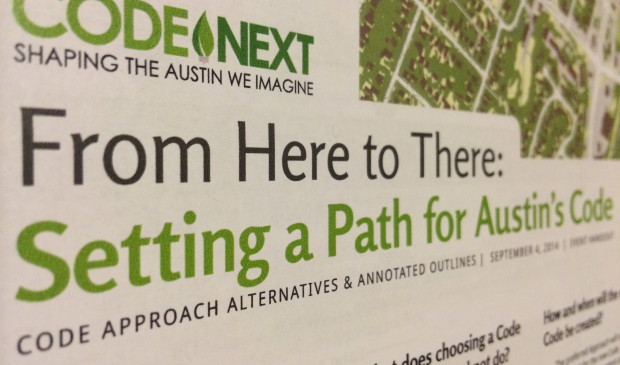Citizens plead for affordability from CodeNEXT
Thursday, January 14, 2016 by
Jo Clifton About 30 members of the public took the opportunity Tuesday night to address CodeNEXT, the citizens advisory group for rewriting Austin’s land development code. The majority of those speaking asked the panel to do something about Austin’s affordability problems.
“We believe that Austin is in a housing crisis,” said Eric Goff of the advocacy group AURA. It wasn’t really news, but Goff was just one of many speakers addressing displacement of residents who cannot afford Austin’s high prices. He said the group hopes that CodeNEXT can be “a way to move substantially down a different path,” offering more affordable housing.
Goff urged the code rewrite group to make sure that there is a broad range of what he called the “missing middle housing” throughout the city.
Disability advocate John Woodley talked about the difficulties that disabled people have in finding housing that is both accessible and affordable, and he expressed the hope that the new code would force developers to build more housing that disabled people could rent.
Geoffrey Tahuahua, speaking on behalf of Home Builders Association of Greater Austin, told the committee that there have been 108 180 amendments to the land development code since 1984. When the draft of the new code is complete, Tahuahua said, HBA would get together with other developer groups to offer insights on the proposed changes.
Ann Hutchison McCormick, a retired city employee who lives in the newly annexed Lost Creek subdivision, said her neighborhood is threatened by urban-style development such as large office buildings and increased traffic. Although Lost Creek came into the city “kicking and screaming,” its residents now want to participate in the CodeNEXT process. What the neighborhood needs, McCormick said, is a safe way for pedestrians and bicyclists to become connected to the rest of the city.
After affordability, the most common theme among speakers was preservation of Austin’s green infrastructure. Linda Guerrero, a longtime parks advocate, urged the group to make sure the new code helps preserve the city’s trees. She and others also expressed concern about flooding and the impact of more development on people living in flood-prone areas, particularly Southeast Austin.
Frank Harren, a real estate agent and attorney, said, “When we did our neighborhood planning effort in 1997, it was seriously flawed because we did it without reference to our comprehensive plan, and everyone who was involved in the process will tell you that. What evolved over time was a patchwork quilt of small area plans that had no coordinating effort, either among the plans themselves or with a comprehensive plan.
“So essentially,” Harren continued, “we got a collection of plans that says, … ‘Here’s what we want in our small area of the city.’ And they didn’t try to evaluate what the impact of those plans would be collectively on our city’s affordability, density or anything else.” The result was sprawl and a lack of affordability, he said. The city has, through its zoning and planning decisions, failed to follow the comprehensive plan, which Harren said “is not legal, and it’s not right.”
He urged the committee to make sure that the code will be in line with the current comprehensive plan, Imagine Austin. A rewrite of the code was one of the recommendations of Imagine Austin.
Attorney Fred Lewis, the only speaker who did not talk about any particular land-use issue, urged the committee to make sure that the code rewrite is transparent and put before the public in a way that would allow it to follow along with the changes. He noted that the Zucker Report showed there is a great deal of distrust of the city’s land development staff. He recommended that the committee use derivation and disposition tables to show where each part of the proposed code came from and where each part of the old code went.
“And if you do it right, you will have a better discussion,” Lewis said, adding that years from now, people will be able to look at the tables and know where each code provision came from and what happened to the old code provisions. He said the Austin Neighborhoods Council had adopted a resolution supporting use of the derivation and disposition tables.
At the end of the meeting, Chair Dave Sullivan told the group that he had been talking with consultants working on the code rewrite and that there would not be a draft in 2016. He predicted that the first draft would come out in early 2017 and that City Council would vote on it in late 2017.
Jim Robertson, project manager on CodeNEXT, was not quite ready to confirm Sullivan’s prediction, but he wasn’t ready to deny it, either. He noted that those working on the project had been in the process for nearly three years already.
This story has been corrected to reflect the correct spelling of Frank Harren’s name and to update the correct number of amendments which was 180, not 108.
You're a community leader
And we’re honored you look to us for serious, in-depth news. You know a strong community needs local and dedicated watchdog reporting. We’re here for you and that won’t change. Now will you take the powerful next step and support our nonprofit news organization?









